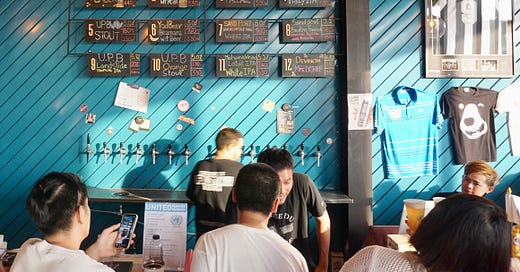Beer, the long arm of the law, and an election surprise
Thai beer geeks have operated in a gray area—or broken the law entirely—for years. Now, they may finally get what they've wanted for so long: the right to make and sell beer in their own country.
Thai brewers may have rolled their rock over the mountaintop
I’ve always had a strange obsession with the myth of Sisyphus, the Greek tale about the king of Ephyra, who is forced to push a rock up a mountain for eternity. Whenever the rock nears the top, it tumbles back down, and Sisyphus starts over.
The parallels between rolling a rock up a mountain and modern life’s futile endeavors are pretty clear to me. (Cleaning my cats’ litter boxes comes to mind.) But I usually think about Sisyphus in terms of seemingly hopeless political battles.
And maybe none have seemed more futile or everlasting to me than the fight I’ve witnessed Thai brewers wage over the right to make beer in their own country.
I’ve lived in Bangkok since 2011. When I moved to the city, craft beer as most know it—IPAs, barrel-aged stouts, etc.—did not exist. Then, suddenly, it was everywhere.
In 2013, import companies began to bring in brands like Deschutes, Rogue, and Mikkeller. Soon after, Wichit Saiklao, a.k.a. Chit, opened his namesake Chit Beer, selling homebrewed pale ales, wheat beers, and more experimental beers on Koh Kret, a tiny island in the Chao Phraya River north of Bangkok.
Making and selling homebrewed beer was, and still is, illegal. It’s also very popular, even if it sometimes (read: every time) gives you the shits.
Chit’s bar groans with the weight of beer geeks and tourists each weekend. Starting from an open-air hutch pressed up against the side of the river, the bar has seemed to expand each year. Now it gets so rammed that I occasionally find myself picturing dozens of people crashing through the beams into the languid, latte-hued water below. (That has never happened, for the record, and yikes if it ever does.)
While I’m sure Koh Kret’s generally older, working-class community could do without some of the long-haulers stumbling out of the bar after day-long drinking sessions, it’s undeniable that Chit Beer has brought new energy (i.e., money and attention) to an island hidden in the shadows of Bangkok’s heaving downtown core.
The bar also helped catalyze a Thai craft beer boom.
Chit has taught dozens of Thai brewers how to make beer. Many today have their own popular beer brands. And all of them, including Chit, have received or been threatened with fines—or worse—for breaking alcohol control laws.
Homebrewer-turned-politician Taopiphop Limjittrakorn was even arrested for it.
Until recently, the law in Thailand stipulated that brewers must have the capacity to make between 100 thousand and 1 million liters of beer, as well as put up 10 million baht in capital, to obtain a license. In other words, for the average price of a 10-hectare winery in Italy—or the same price as, say, a slightly dented Ferrari—you get a piece of paper allowing you to brew.
That law was amended late last year, lifting the capital and capacity limits but creating sizable new barriers. In short: very little has changed. Independent beer still accounts for less than 1% of the market (that figures includes imports).
Yet despite there being almost zero chance for change, Thai brewers have kept pushing their rock up the hill, trying to force the issue at the legislative level.
They have brewed or talked about brewing online—also a crime! A handful of people have received life-altering fines for sharing photos of beer on social media.
Unable to make beer at home, some have turned to expensive loopholes, like brewing in Cambodia, Laos, Singapore, or Vietnam and then importing their products into Thailand to sell them legally, albeit with eye-watering tariffs increasing the price.
Every step of the way, Thailand’s beer community faced a Berlin Wall of brewing regulations erected by a conservative elite who, frankly, despise alcohol. To tie this whole thing to the myth I mentioned in the lede, it was as if collectively they were rolling the world’s biggest boulder up Mt. Everest.
But suddenly their efforts don’t seem so futile after all.
The progressive Move Forward Party’s (MFP) landslide win in the recent Thai elections has filled millions with hope, including the members of its homebrewing and small business communities. That’s because the MFP has promised to reform Thailand’s draconian alcohol laws. Taopiphop, now a highly visible MFP member of parliament, recently told me that the laws can be changed “within a week” once, or if, the party takes power—no sure thing in a country with 13-plus coups under its belt.
Under MFP’s proposed laws, Taopiphop expects craft beer to own about 10% of the market within five years.
Soon, the beer on supermarket shelves and served in bars might bear little resemblance to the wan rice lagers available today. The excitement is palpable.
At the grand opening of the United Peoples Brewery (UPB) in late May, Supapong “Toon” Pruenglampoo, co-founder of the microbrewery and founder of Sandport, told me he had goosebumps just thinking about the future.
There’s a long way to go before the Thai beer community can toast to lasting change. But for the first time in a decade, talk of a liberalized beer industry in Thailand doesn’t sound so farfetched. Maybe it’s all downhill from here.





